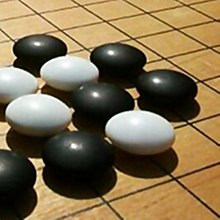This is an old revision of this page, as edited by Ashiyura (talk | contribs) at 14:09, 2 July 2018 (details of end of Hon'inbō line). The present address (URL) is a permanent link to this revision, which may differ significantly from the current revision.
Revision as of 14:09, 2 July 2018 by Ashiyura (talk | contribs) (details of end of Hon'inbō line)(diff) ← Previous revision | Latest revision (diff) | Newer revision → (diff)| Part of a series on |
| Go |
|---|
 |
| Game specifics |
|
| History and culture |
| Players and organizations |
| Computers and mathematics |
Honinbō (本因坊, Hon'inbō) was the name of one of the four major schools of Go in Japan. Easily the strongest school of Go for most of its existence, it was established in 1612 and survived until 1940.
Upon the closure of the school, the title Hon'inbō came to be used for the winner of the Honinbo Tournament, which is now an annual professional go event in Japan. It is run under the titleholder system, meaning that at any given time there is a player who can use the title Hon'inbō. It is customary for Japanese players to take a special personal name as Hon'inbō, a unique feature of this title; for example Takagawa Kaku held the title for nine years, and during this time was referred to as Hon'inbō Shukaku. Players of other nationalities by custom do not adopt a special name, but do use the Hon'inbō title.
Heads of the Hon'inbō School
- 1st Hon'inbō, Sansa (算砂, 1612–1623)
- 2nd Hon'inbō, San'etsu (算悦, 1630–1658)
- 3rd Hon'inbō, Dōetsu (道悦, 1658–1677)
- 4th Hon'inbō, Dōsaku (道策, 1677–1702)
- 5th Hon'inbō, Dōchi (道知, 1702–1727)
- 6th Hon'inbō, Chihaku (知伯, 1727–1733)
- 7th Hon'inbō, Shūhaku (秀伯, 1733–1741)
- 8th Hon'inbō, Hakugen (伯元, 1741–1754)
- 9th Hon'inbō, Satsugen (察元, 1754–1788)
- 10th Hon'inbō, Retsugen (烈元, 1788–1808)
- 11th Hon'inbō, Genjō (元丈, 1809–1827)
- 12th Hon'inbō, Jōwa (丈和, 1827–1839)
- 13th Hon'inbō, Jōsaku (丈策, 1839–1847)
- 14th Hon'inbō, Shūwa (秀和, 1847–1873)
- 跡目(heir) Hon'inbō, Shūsaku (秀策)
- 15th Hon'inbō, Shūetsu (秀悦, 1873–1879)
- 16th Hon'inbō, Shūgen (秀元, 1879–1884)
- 17th Hon'inbō, Shūei (秀栄, 1884–1886)
- 18th Hon'inbō, Shūho (秀甫, 1886)
- 19th Hon'inbō, Shūei (秀栄, 1887–1907)
- 20th Hon'inbō, Shūgen (秀元, 1907–1908)
- 21st Hon'inbō, Shūsai (秀哉, 1908–1940)
Hon'inbō Shūsai sold his title to the Japan Go Association before retiring in 1936, effectively ending the Hon'inbō line.
All three of the "go saints" (or Kisei) came from this school— Dosaku, Shusaku and Jowa (although Jowa is frequently reviled because of his machinations while trying to become Meijin). Most of the holders of the Meijin title (awarded to a player recognised by all as strongest) were also from this house. Another prominent member was Hon'inbō Shūsaku (秀策, 1829–1862), who was heir to become head of the school, but died of cholera before officially becoming Hon'inbō.
The Nihon Ki-in decided to name players who had won the Hon'inbō tournament 5 times or more in a row (making them Honorary Hon'inbō) would be given the Hon'inbō prefix after Cho Chikun won the title 10 times in a row. This meant that Takagawa Kaku (9 in a row), Sakata Eio (7), Ishida Yoshio (5), and Cho Chikun (10) may be addressed as 22nd, 23rd, 24th and 25th Hon'inbō respectively whether or not they are currently holding the Hon'inbō title.
Honorary Hon'inbōs
- 22nd Hon'inbō Takagawa Kaku
- 23rd Hon'inbō Sakata Eio
- 24th Hon'inbō Ishida Yoshio
- 25th Hon'inbō Cho Chikun
- 26th Hon'inbō Iyama Yuta
See also
Template:Misplaced Pages books
- International Go Federation
- List of professional Go tournaments
- Four go houses
- Honorary Honinbo
- Iemoto
References
- John Power, Invincible: The Games of Shusaku